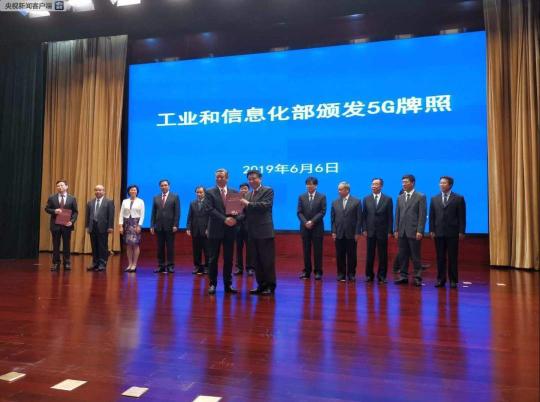Why is China fast-tracking 5G licensing?

China issues 5G licenses for commercial use on June 6, 2019. (Photo/CCTV.com)
By Liu Yuying
(CNS) -- China has issued 5G licenses to commercial firms for the first time, advancing its previous timetable set at 2020, state media reported.
China Telecom, China Mobile, China Unicom and China Broadcasting Network were the first to receive 5G commercial licenses, media reported.
The announcement came amid a global push to develop 5G with services launched in South Korea, the U.S., Switzerland and the UK. Industry group the Global System for Mobile Communications Association (GSMA) estimates 29 markets will have 5G services by the end of this year, with 10 million connections.
This enthusiasm among nations for the super-fast technology in part comes from its strategic importance, said Yang Hua, Secretary General of the Telecommunication Development Industry Alliance, adding that issuing 5G licenses will attract industry players to invest in the domestic market and help countries build industrial and commercial advantages.
Amid increasingly intense competition, China’s advanced 5G licensing comes as an attempt to seize an early advantage in the global race.
China already has competitive edges in 5G technology, standards and industry, noted Gong Daning, a senior engineer of the Policy and Economic Research Institute at the China Academy of Information and Communications Technology.
Some concepts, application scenarios and technical measures proposed by Chinese companies have been included in the International Telecommunication Union’s definition of 5G. Several technologies from Chinese companies such as flexible system design, polar codes, large scale MIMO and the new network structure, have become global standards, Gong said.
China has already developed strong industrial capacity, and Chinese wireless products lead in performance among their peers, with a high quality-price ratio.
According to a latest report on 5G patents released by patent data firm IPlytics, by April this year, Chinese companies had become the largest source of standard-essential patents (SEPs) in communications systems, accounting for more than one-third of the global total. Chinese telecoms equipment maker Huawei topped the list with 15 percent of total SEPs.
Chinese companies have already started large-scale tests on 5G networks and demonstration services in multiple areas across the country. China Mobile, the country’s largest telecom operator, has launched external field tests in five cities: Hangzhou, Guangzhou, Suzhou and Wuhan, each of which will see 100 5G base stations. The telecom will also demonstrate 5G services and applications in 12 cities, including Beijing, Chengdu and Shenzhen.
As infrastructure investment plays an increasingly smaller role in boosting China’s economy, 5G will help digitalize traditional industries and power the high-quality development of the Chinese economy.
The ultimate significance of 5G lies in the industrial Internet, according to Wu Hequan, Academician of Chinese Academy of Engineering. While the 5G industry will initially focus on the consumer market, Wu predicts the industrial sector to make up 80 percent by 2035.
According to a report by the China Academy of Information and Communications Technology, commercializing 5G will directly contribute to an economic output of 10.6 trillion yuan (US$1.5t) between 2020 and 2025. Its indirect contribution is expected to reach 24.8 trillion yuan (US$3.59t). The industry is estimated to create more than three million jobs by 2025.

